Jul. 4 - St. Andrew, Archbishop of Crete, Author of the Great Canon

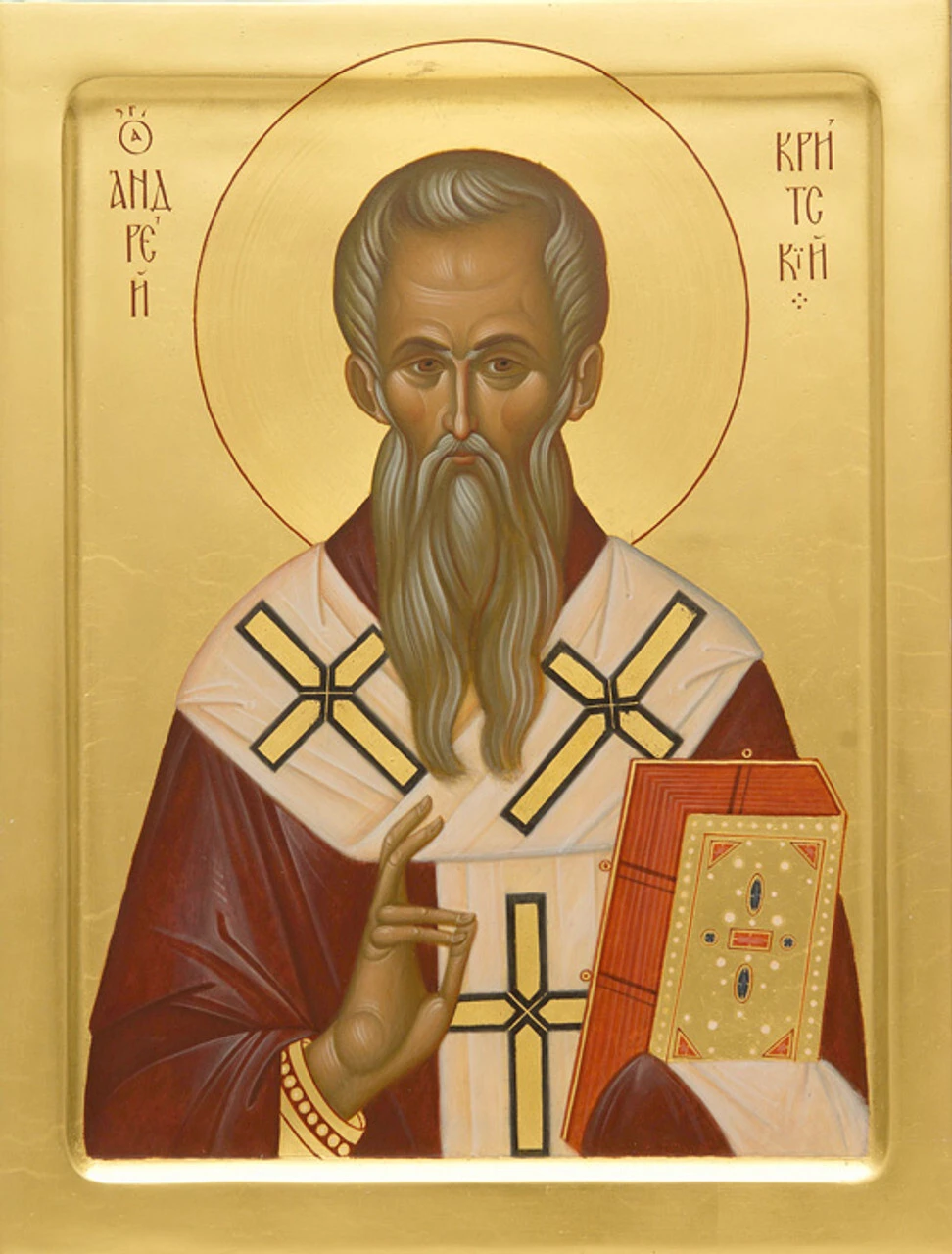
Saint Andrew, Archbishop of Crete, was born in the city of Damascus into a pious Christian family. Up until seven years of age the boy was mute and did not talk. However, after communing the Holy Mysteries of Christ he found the gift of speech and began to speak. And from that time the lad began earnestly to study Holy Scripture and the discipline of theology.
At fourteen years of age he went off to Jerusalem and there he accepted monastic tonsure at the monastery of Saint Savva the Sanctified. Saint Andrew led a strict and chaste life, he was meek and abstinent, such that all were amazed at his virtue and reasoning of mind. As a man of talent and known for his virtuous life, over the passage of time he came to be numbered among the Jerusalem clergy and was appointed a secretary for the Patriarchate -- a writing clerk. In the year 680 the locum tenens of the Jerusalem Patriarchate, Theodore, included archdeacon Andrew among the representatives of the Holy City sent to the Sixth Ecumenical Council, and here the saint contended against heretical teachings, relying upon his profound knowledge of Orthodox doctrine. Shortly after the Council he was summoned back to Constantinople from Jerusalem and he was appointed archdeacon at the church of Hagia Sophia, the Wisdom of God. During the reign of the emperor Justinian II (685-695) Saint Andrew was ordained bishop of the city of Gortineia on the island of Crete. In his new position he shone forth as a true luminary of the Church, a great hierarch -- a theologian, teacher and hymnographer.
Saint Andrew composed many inspired writings, including the Great Canon of Repentance which is sung on Monday through Thursday of the first week of Lent, after the usual beginning of Compline, and following Psalm 69/70. In current Greek practice the Great Canon begins after the Doxology. The Great Canon of Repentance includes 250 troparia within its 9 Odes. Before each Troparion of the Canon, we make the Sign of the Cross and bow and sing "Have mercy upon me, O God, have mercy upon me." On Thursday of the fifth week, the Great Canon is sung continuously in its entirety. After Psalm 90/91 "God is with us," is read plainly and without a melody (outside of Great Lent). During Lent, however, the verses are sung slowly by the choir with the refrain "For God is with us" after each verse.1
Saint Andrew has also composed the Canon for the Feast of the Nativity of Christ, three Odes for Compline of Palm Sunday, and also in the first four days of Passion Week, as well as verses for the Feast of the Meeting of the Lord, and many other Church hymns. His hymnographic legacy was continued by other great composers of following ages: Saints John of Damascus, Cosmas of Maiuma, Joseph the Hymnographer, Theophánēs the Branded, etc.
Church historians are not of the same opinion as to the date of death of the saint. One suggests the year 712, while others -- the year 726. He died on the island of Mytilene, while returning to Crete from Constantinople, where he had been on churchly business. His relics were transferred to Constantinople. In the year 1350 the pious Russian pilgrim Stephen Novgorodets saw the relics at the Constantinople monastery named for Saint Andrew of Crete.
Apolytikion Emulating David you sang a new song in the assembly of the righteous. As an initiate of the Holy Spirit you guided us with hymns of grace and the word of righteousness for our salvation, O Andrew, glory of the Fathers.
Kontakion Trumpeting forth divine melodies, you were shown as a far-shining luminary for the world. You shone forth with the radiant light of the Trinity, O Venerable Andrew. Therefore we all cry to you: "Do not cease to intercede for us all.
Jul. 3 - St. Hyacinth the Martyr of Caesarea

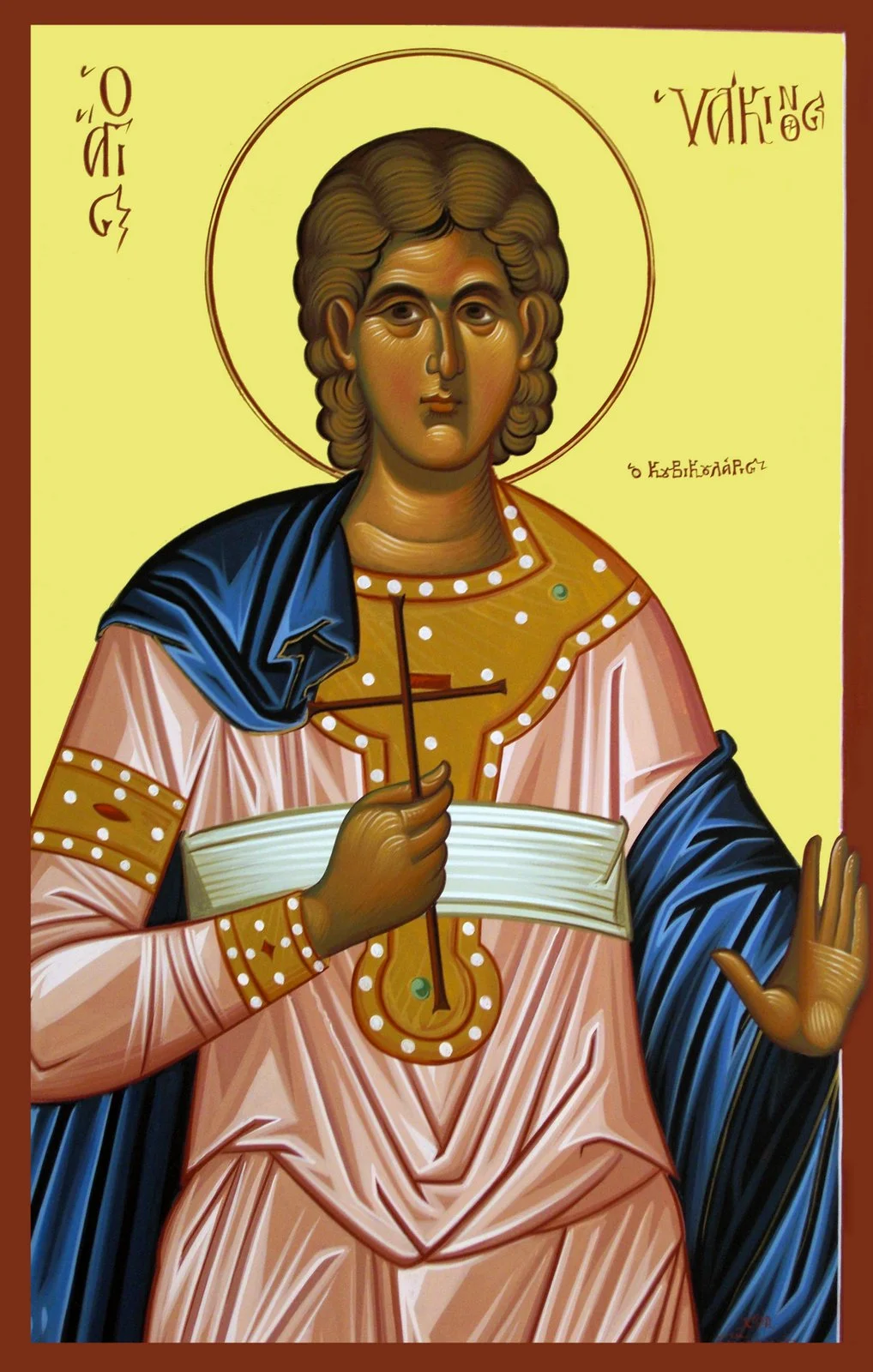
Saint Hyacinth, a native of Caesarea in Cappadocia, was raised in a Christian family. The emperor Trajan made the boy his “cubicularius” (chamberlain), unaware that he was a secret Christian.
One day, while the emperor and his entourage were offering sacrifice to idols, the young Hyacinth remained at the palace, shut himself up in a small room, and prayed fervently to the Lord Jesus Christ. One of the servants overheard him praying and denounced him to the emperor. He said that although Hyacinth was entrusted with an imperial position, he did not honor the Roman gods, and was secretly praying to Christ.
Hyacinth was brought to trial before Trajan, who tried to persuade him to deny Christ and sacrifice to the deaf and dumb idols, but the holy martyr remained steadfast and declared that he was a Christian. He was whipped and thrown into prison, where the only food given to him was what had already been offered to the idols. They hoped that he would be overcome with hunger and thirst and eat it. Saint Hyacinth did not eat the food, and he died after thirty-eight days. When they came to torture him again, they found his dead body.
The jailer saw two angels in the cell. One covered the saint’s body with his own garment, and the other placed a crown of glory on his head.
The twelve-year-old Hyacinth suffered for Christ in the year 108 in the city of Rome. Later, the saint’s relics were transferred to Caesarea.
Apolytikion Like a fragrant hyacinth of the Church of Christ, O all-blessed Hyacinth, you radiate grace to the ends of the world. By the brilliance of your confession of faith, you were illustrious in contest in emulation of God the Word and you ever illumine those who acclaim you.
Kontakion Come, you faithful, plait a crown of unfading hyacinths today for the Martyr Hyacinth, and let us cry to Him: “Rejoice, glory of martyrs.”
Jul. 2 - St. Juvenal, Patriarch of Jerusalem

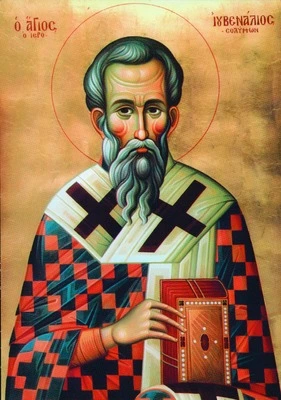
Saint Juvenal, Patriarch of Jerusalem, occupied the throne of the Holy City during the years 420-458. During this period great luminaries of the Church enlightened the world: Saints Euthymios the Great, Simeon the Stylite, Gerasimos of Jordan, and many others.
Saint Juvenal was a friend and converser with Saint Euthymios the Great. During Saint Juvenal’s archpastoral service, the Eastern Church was troubled by dangerous false teachings, which he opposed with a pastoral zeal, safeguarding the flock of Christ.
The Third Ecumenical Council was convened in the city of Ephesus in 431. It condemned the heresy of Nestorius, which was opposed to the Orthodox teaching about the divine nature of Jesus Christ. Saint Cyril of Alexandria presided at this Council, and among his colleagues was Patriarch Juvenal.
In 451, the Fourth Ecumenical Council met in the city of Chalcedon. It condemned the Eutchian [Monophysite] heresy, which taught that the human nature in Christ was completely swallowed up and absorbed by the divine nature. The Holy Fathers, among them Saint Juvenal, condemned the heresy of Eutychios and affirmed the Orthodox doctrine of the union of two natures in the Lord Jesus Christ, the divine and the human, without separation and without mixture. The heretics, however, continued to confuse the minds of Christians.
At the head of the heretics stood Theodosius, who lived at Jerusalem, and who had won to his side Eudokia, the widow of Emperor Theodosios the Younger (+ 450), who lived at Jerusalem. He demanded that Patriarch Juvenal repudiate the Council of Chalcedon; that is to say, that he should renounce the Orthodox dogma of the two natures in Christ.
Saint Juvenal would not agree to embrace falsehood, and bravely confessed the Chalcedonian doctrine before the heretics. Theodosius and his adherents then deposed Patriarch Juvenal from the patriarchal throne. The Saint fled to Constantinople, to Patriarch Anatolios and the Emperor Marcian. The heretic Theodosios, under Eudokia's patronage, occupied the patriarchal throne in Palestine, but only for twenty months. Emperor Marcian, holding Saint Juvenal in high esteem, placed him on the patriarchal throne once more, and so the Holy Confessor returned to Jerusalem.
The Saint made many efforts to restore Church peace. At the suggestion of Saint Simeon the Stylite, Empress Eudokia repented before Saint Juvenal and returned to communion with the Orthodox. A large part of the Jerusalem flock, who had been led astray by the heretics, followed her. After defeating the pernicious heresies, and establishing oneness of mind and propriety, Patriarch Juvenal reposed peacefully among his faithful flock, after serving as a bishop for thirty-eight years.
Apolytikion O successor of the Brother of the Lord on the archpastoral throne of the holy city of Jerusalem, you are worthy of praise. With the divinely-wise Fathers of Chalcedon you expounded the Incarnation of the Son of God, Who came to renew the world and to deify all men, united with Him in His Church. O Hierarch Father Juvenal, now as you stand before the throne of Father of Lights in the Kingdom, pray for those who lovingly honor you, and may the peace and mercy of the Savior be with us.
Jul. 1 - The Holy Unmercenaries, Sts. Cosmas and Damian, Wonderworkers and Martyrs of Rome

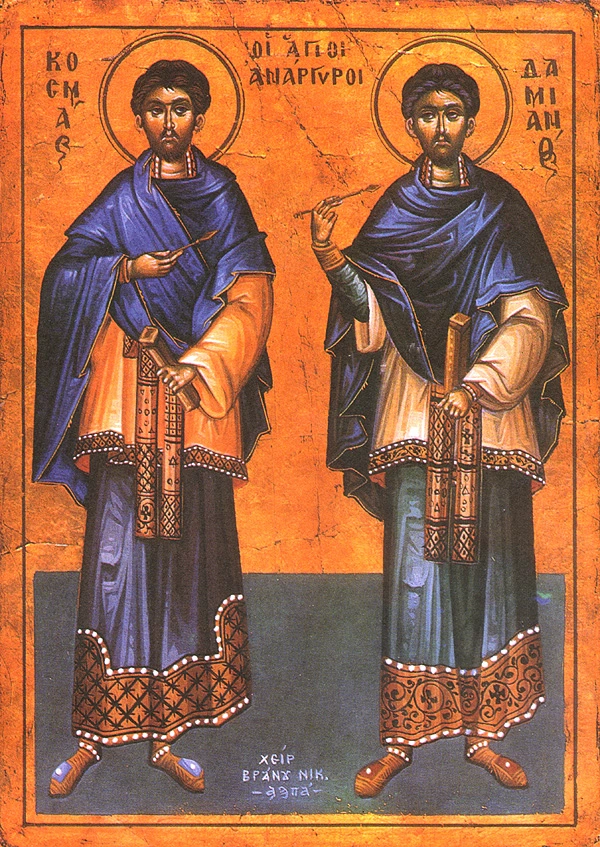
The Holy Martyrs, Wonderworkers and Unmercenary Physicians Cosmas and Damian were born at Rome, brothers by birth, and physicians by profession. They suffered at Rome in the reign of the emperor Carinus (283-284). Brought up by their parents in the rules of piety, they led strict and chaste lives, and they were granted by God the gift of healing the sick. By their generosity and exceptional kindness to all, the brothers converted many to Christ. The brothers told the sick, “It is not by our own power that we treat you, but by the power of Christ, the true God. Believe in Him and be healed.” Since they accepted no payment for their treatment of the infirm, the holy brothers were called “unmercenary physicians.”
Their life of active service and their great spiritual influence on the people around them led many into the Church, attracting the attention of the Roman authorities. Soldiers were sent after the brothers. Hearing about this, local Christians convinced Saints Cosmas and Damian to hide for a while until they could help them escape. Unable to find the brothers, the soldiers arrested instead other Christians of the area where the saints lived. Saints Cosmas and Damian then came out of hiding and surrendered to the soldiers, asking them to release those who had been arrested because of them.
At Rome, the saints were imprisoned and put on trial. Before the Roman emperor and the judge they openly professed their faith in Christ God, Who had come into the world to save mankind and redeem the world from sin, and they resolutely refused to offer sacrifice to the pagan gods. They said, “We have done evil to no one, we are not involved with the magic or sorcery of which you accuse us. We treat the infirm by the power of our Lord and Savior Jesus Christ and we take no payment for rendering aid to the sick, because our Lord commanded His disciples, ‘Freely have you received, freely give’ (Mt. 10: 8).”
The emperor, however, continued with his demands. Through the prayer of the holy brothers, imbued with the power of grace, God suddenly struck Carinus blind, so that he too might experience the almighty power of the Lord, Who does not forgive blasphemy against the Holy Spirit (Mt. 12:31). The people, beholding the miracle, cried out, “Great is the Christian God! There is no other God but Him!” Many of those who believed besought the holy brothers to heal the emperor, and he himself implored the saints, promising to convert to the true God, Christ the Savior, so the saints healed him. After this, Saints Cosmas and Damian were honorably set free, and once again they set about treating the sick.
But what the hatred of the pagans and the ferocity of the Roman authorities could not do, was accomplished by black envy, one of the strongest passions of sinful human nature. An older physician, an instructor, under whom the holy brothers had studied the art of medicine, became envious of their fame. Driven to madness by malice, and overcome by passionate envy, he summoned the two brothers, formerly his most beloved students, proposing that they should all go together in order to gather various medicinal herbs. Going far into the mountains, he murdered them and threw their bodies into a river.
Thus these holy brothers, the Unmercenary Physicians Cosmas and Damian, ended their earthly journey as martyrs. Although they had devoted their lives to the Christian service of their neighbors, and had escaped the Roman sword and prison, they were treacherously murdered by their teacher.
The Lord glorifies those who are pleasing to God. Now, through the prayers of the holy martyrs Cosmas and Damian, God grants healing to all who with faith have recourse to their heavenly intercession.
The Unmercenary Saints Cosmas and Damian of Rome should not be confused with the Unmercenary Saints Cosmas and Damian of Asia Minor, or the Unmercenary Saints Cosmas and Damian of Arabia.
Part of the skulls of Saints Cosmas and Damian are located in the sacred Pantokrator Monastery on Mount Athos. Pieces of the Holy Relics of Saints Cosmas and Damian may be found in the Roman Catholic Church of the Holy Unmercenaries in Rome.
Apolytikion Holy unmercenaries and wonderworkers, Cosmas and Damian, visit our infirmities. Freely you have received; freely give to us.
Kontakion Having received the grace of healing, you grant healing to those in need. Glorious wonder workers and physicians, Cosmas and Damian, visit us and put down the insolence of our enemies, and bring healing to the world through your miracles.
Jun. 30 - Synaxis of the Holy, Glorious, and All-Laudable Twelve Apostles

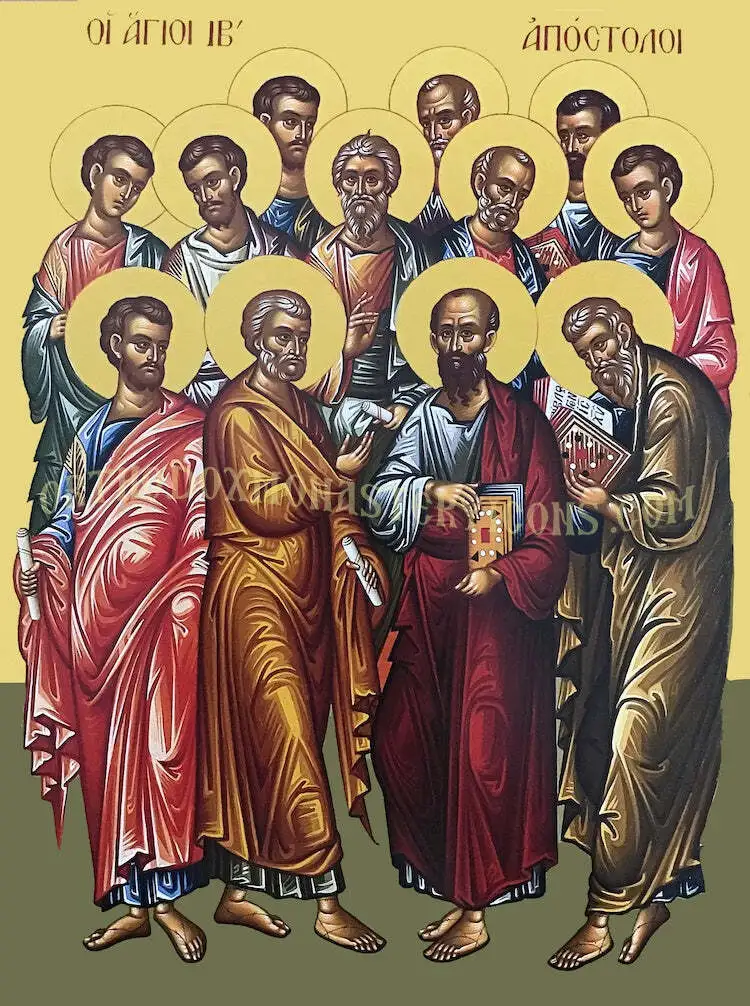
The Synaxis of the Glorious and All-Praiseworthy Twelve Apostles of Christ appears to be an ancient Feast. The Church honors each of the Twelve Apostles on separate dates during the year, and has established a general commemoration for all of them on the day after the commemoration of the Glorious and First-Ranked among the Apostles Peter and Paul.
The holy God-crowned Emperor Constantine the Great built a church in Constantinople in honor of the Twelve Apostles. There are instructions for celebrating this Feast which date from the fourth century. For lists of the Apostles' names, see: Mt.10:2, Mark 3:14, Luke 6:12, Acts 1:13, 26.
The holy, glorious, all-laudable Apostle Andrew the First-called is also commemorated on November 30. He was the brother of Saint Peter.
The holy, glorious, all-laudable Apostle James is also commemorated on April 30. He and his brother John are the sons of Zebedee, and were called “sons of Thunder” (Mark 3: 17).
The holy, glorious, all-laudable Apostle and Evangelist, virgin, and beloved friend of Christ, John the Theologian is also commemorated on September 26 and May 8. He and his brother James are the sons of Zebedee, and were called “sons of Thunder” (Mark 3:17).
The holy, glorious, all-laudable Apostle Philip is also commemorated on November 14.
The holy, glorious, all-laudable Apostle Bartholomew is also commemorated on June 11 and August 25.
The holy, glorious, all-laudable Apostle Thomas is also commemorated on October 6 and on the Sunday after Pascha.
The holy, glorious, all-laudable Apostle and Evangelist Matthew is also commemorated on November 16.
The holy, glorious, all-laudable Apostle James, the son of Alphaeus, is also commemorated on October 9.
The holy, glorious, all-laudable Apostle Jude is also commemorated on June 19. He is also known as Thaddeus (but should not be confused with Saint Thaddeus of the Seventy, who is commemorated on August 21), and was the brother of Saint James.
The holy, glorious, all-laudable Apostle Simon the Zealot is also commemorated on May 10.
The holy, glorious, all-laudable Apostle Matthias is also commemorated on August 9.
Apolytikion First-enthroned of the apostles, teachers of the universe: Entreat the Master of all to grant peace to the world, / and to our souls great mercy!
Kontakion O Lord, receive the steadfast and divinely voiced preachers, the pinnacle of Your disciples, unto their rest and the enjoyment of Your blessings. You received, above every offering, their labors and their life. You alone know what the heart holds.
Jun. 29 - The Holy Glorious and All-Laudable Leaders of the Apostles, Sts. Peter and Paul

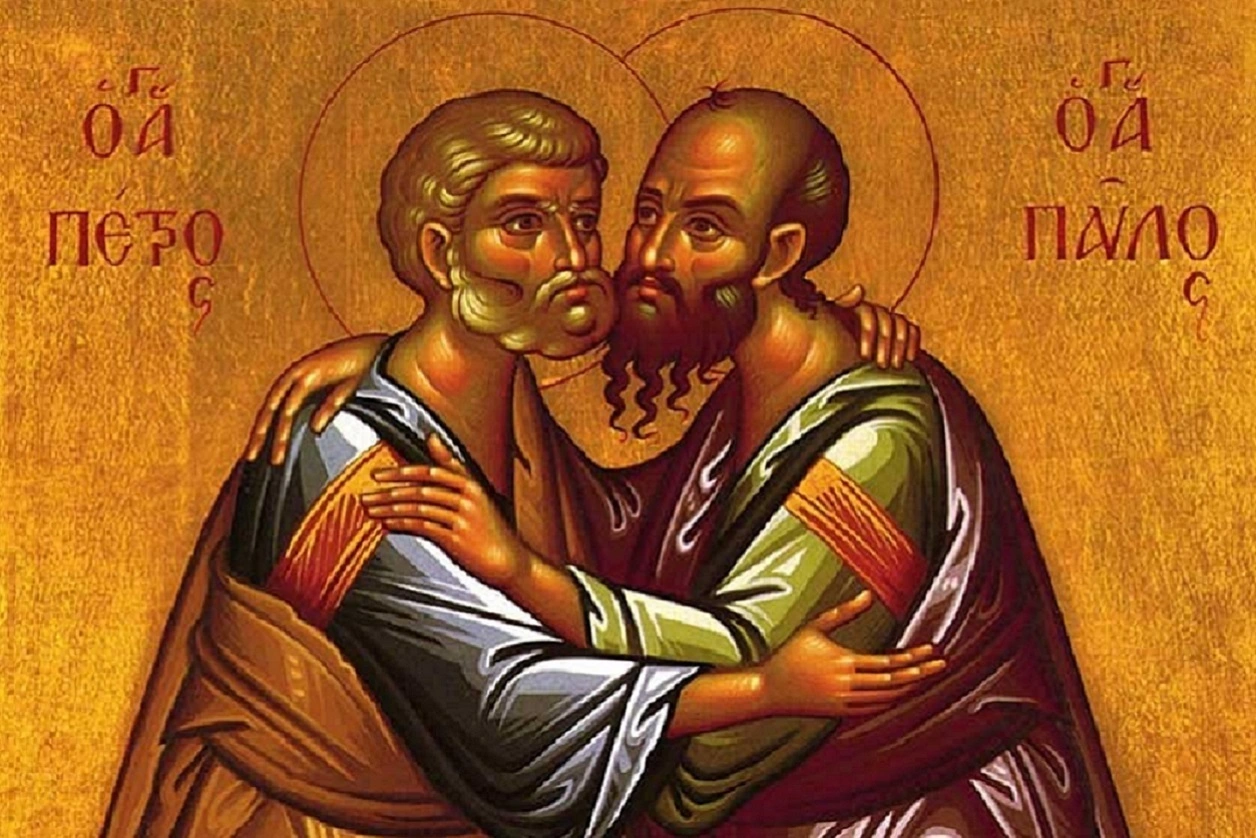
The divinely-blessed Peter was from Bethsaida of Galilee. He was the son of Jonas and the brother of Andrew the First-called. He was a fisherman by trade, unlearned and poor, and was called Simon; later he was renamed Peter by the Lord Jesus Christ Himself, Who looked at him and said, "Thou art Simon the son of Jonas; thou shalt be called Cephas (which is by interpretation, Peter)" (John 1:42). On being raised by the Lord to the dignity of an Apostle and becoming inseparable from Him as His zealous disciple, he followed Him from the beginning of His preaching of salvation up until the very Passion, when, in the court of Caiaphas the high priest, he denied Him thrice because of his fear of the Jews and of the danger at hand. But again, after many bitter tears, he received complete forgiveness of his transgression. After the Resurrection of Christ and the descent of the Holy Spirit, he preached in Judea, Antioch, and certain parts of Asia, and finally came to Rome, where he was crucified upside down by Nero, and thus he ascended to the eternal habitations about the year 66 or 68, leaving two Catholic (General) Epistles to the Church of Christ.
Paul, the chosen vessel of Christ, the glory of the Church, the Apostle of the Nations and teacher of the whole world, was a Jew by race, of the tribe of Benjamin, having Tarsus as his homeland. He was a Roman citizen, fluent in the Greek language, an expert in knowledge of the Law, a Pharisee, born of a Pharisee, and a disciple of Gamaliel, a Pharisee and notable teacher of the Law in Jerusalem. For this cause, from the beginning, Paul was a most fervent zealot for the traditions of the Jews and a great persecutor of the Church of Christ; at that time, his name was Saul (Acts 22:3-4). In his great passion of rage and fury against the disciples of the Lord, he went to Damascus bearing letters of introduction from the high priest. His intention was to bring the disciples of Christ back to Jerusalem in bonds. As he was approaching Damascus, about midday there suddenly shone upon him a light from Heaven. Falling on the earth, he heard a voice saying to him, "Saul, Saul, why persecutest thou Me?" And he asked, "Who art Thou, Lord?" And the Lord said, "I am Jesus Whom thou persecutest; it is hard for thee to kick against the pricks." And that heavenly voice and brilliance made him tremble, and he was blinded for a time. He was led by the hand into the city, and on account of a divine revelation to the Apostle Ananias, he was baptized by him, and both his bodily and spiritual eyes were opened to the knowledge of the Sun of Righteousness. And straightway- O wondrous transformation! - beyond all expectation, he spoke with boldness in the synagogues, proclaiming that "Christ is the Son of God" (Acts 9:1-21). As for his zeal in preaching the Gospel after these things had come to pass, as for his unabating labors and afflictions of diverse kinds, the wounds, the prisons, the bonds, the beatings, the stonings, the shipwrecks, the journeys, the perils on land, on sea, in cities, in wildernesses, the continual vigils, the daily fasting, the hunger, the thirst, the nakedness, and all those other things that he endured for the Name of Christ, and which he underwent before nations and kings and the Israelites, and above all, his care for all the churches, his fiery longing for the salvation of all, whereby he became all things to all men, that he might save them all if possible, and because of which, with his heart aflame, he continuously traveled throughout all parts, visiting them all, and like a bird of heaven flying from Asia and Europe, the West and East, neither staying nor abiding in any one place - all these things are related incident by incident in the Book of the Acts, and as he himself tells them in his Epistles. His Epistles, being fourteen in number, are explained in 250 homilies by the divine Chrysostom and make manifest the loftiness of his thoughts, the abundance of the revelations made to him, the wisdom given to him from God, wherewith he brings together in a wondrous manner the Old with the New Testaments, and expounds the mysteries thereof which had been concealed under types; he confirms the doctrines of the Faith, expounds the ethical teaching of the Gospel, and demonstrates with exactness the duties incumbent upon every rank, age, and order of man. In all these things his teaching proved to be a spiritual trumpet, and his speech was seen to be more radiant than the sun, and by these means he clearly sounded forth the word of truth and illumined the ends of the world. Having completed the work of his ministry, he likewise ended his life in martyrdom when he was beheaded in Rome during the reign of Nero, at the same time, some say, when Peter was crucified.
Apolytikion O foremost of the Apostles and teachers of the inhabited earth, intercede with the Master of all to grant peace to the world and great mercy to our souls.
Kontakion You received the steadfast and divinely-inspired Heralds, O Lord, the Foremost Apostles, for the enjoyment of Your blessings and repose. For You recognized their labors and death as greater than any burnt offering, for You alone know what is in the hearts of men.
Jun. 28 - St. Paul the Physician of Corinth

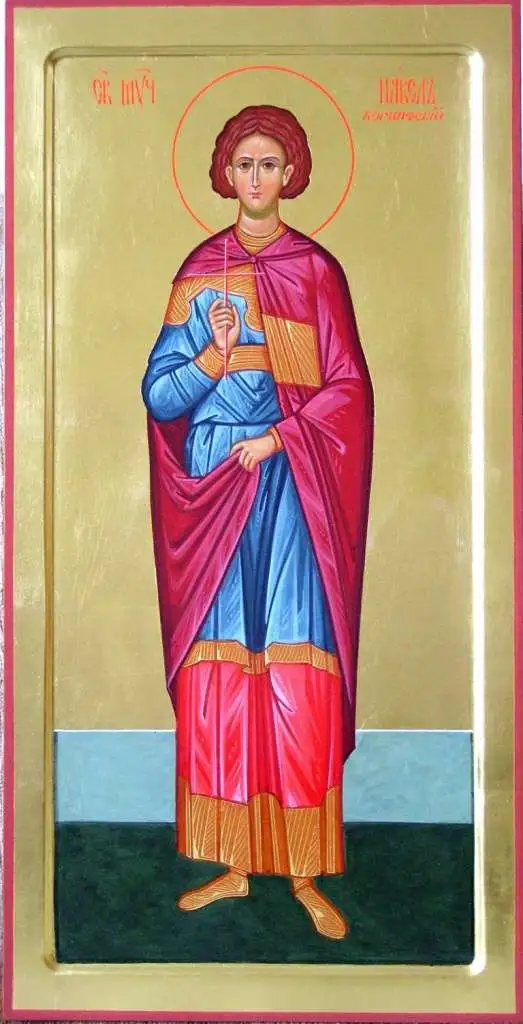
Saint Paul lived around the seventh century and was from the city of Corinth. He was born to Christian parents who raised him in piety. While still young, he withdrew to a monastery to devote his life to God, and with much labor he became an experienced ascetic. He had an especially difficult struggle with the impure spirit of fornication. One night, as Paul stood in prayer, a demon appeared to him and said that if he did not satisfy his carnal lust at least one time, he would come against him in a brutal way. With the power of the Cross and the name of Christ he drove the impure spirit of fornication away from himself, and in turn that spirit created a malicious falsehood against the Saint.
One day a depraved woman came to the monastery with a newborn infant and said that the venerable Paul was the father. The holy elder received the child with joy as if it was truly his own, enduring the slander as a trial permitted by God for his benefit. Certain men then dragged him from the monastery, placed the child in his arms and forced him to walk throughout the town for the people to ridicule and spit on him, to expose him as a false monk. The baby was only a few days old. The venerable Paul then prayed fervently to God and said to the people: "Behold, let the child himself say who is his father." The child stretched out its hand from the swaddling clothes and pointed to a blacksmith and said: "That man is my father and not Paul the monk!" The adversaries of Paul then became ashamed and asked his forgiveness.
God granted great healing powers to Paul so that when he placed his hand on the sick, they became whole. For this reason he became known as "the Physician". Paul reposed peacefully at the age of seventy, pleasing God by his life on earth.
Apolytikion By a flood of tears you made the desert fertile, and your longing for God brought forth fruits in abundance. By the radiance of miracles you illumined the whole universe! O our holy father Paul, pray to Christ our God to save our souls!
Who could possibly have foreseen that this would go tits up?!
Jun. 27 - St. Sampson the Hospitable of Constantinople

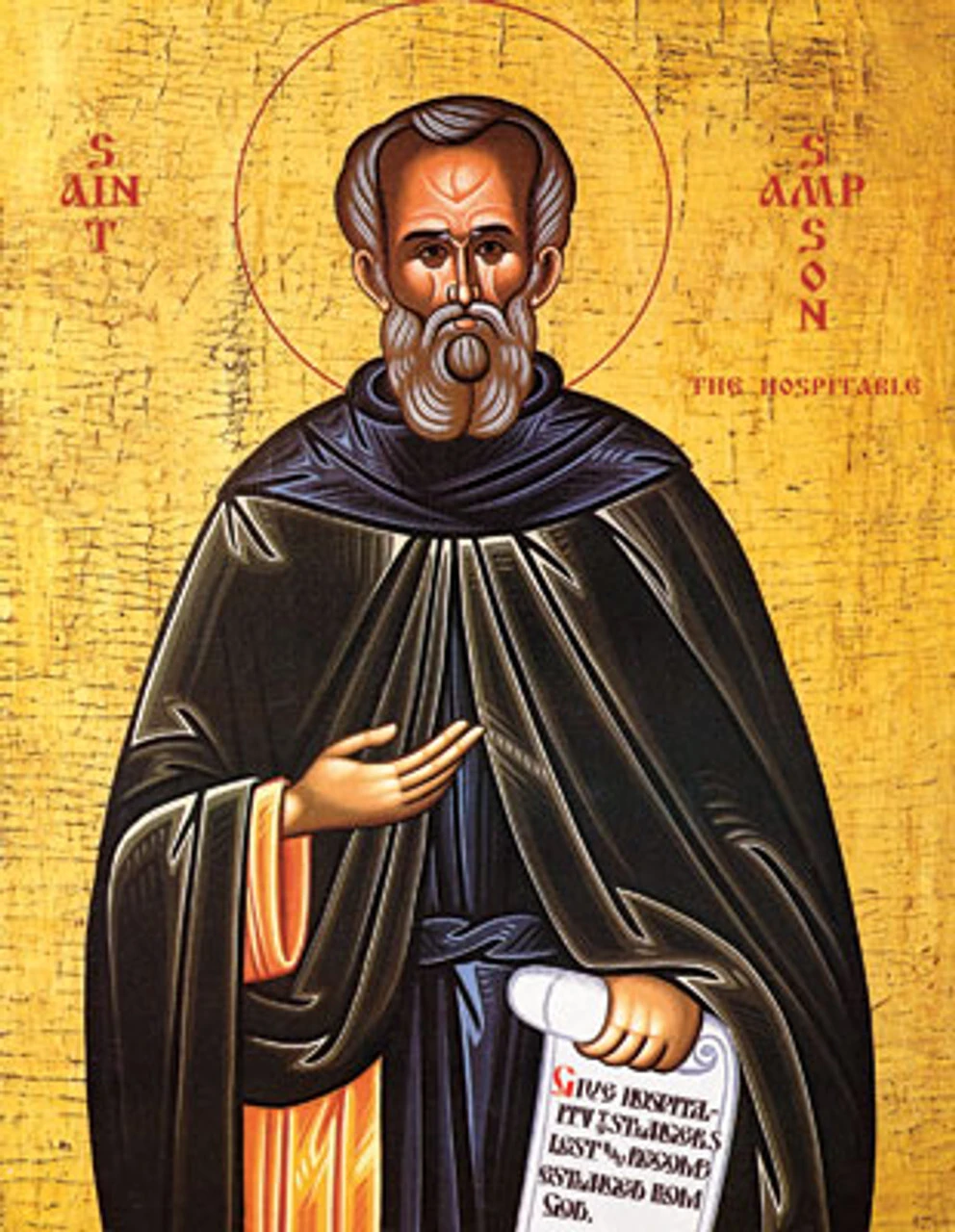
Saint Sampson (Σαμψών) was born in Rome, the son of wealthy, but devout and virtuous parents. He received an excellent education, studying philosophy and medicine, among other subjects. From his earliest childhood, he lived an exemplary Christian life. After the death of his parents he transformed the family estate into a clinic for the sick. Word of his healing skills spread, and so many people came to him that he had to hire a staff to care for the increasing numbers of people who sought his help. When he had an adequate staff, he donated all of his wealth to the clinic, and was content to live in poverty (Luke 12:33-34).
Saint Sampson went to Constantinople, where he hoped to spend the rest of his life in asceticism. He found, however, that there was just as much need for his skill in Constantinople as there had been in Rome. He bought a modest home and began to treat the sick. God blessed Saint Sampson's work and gave him the grace of working miracles. He healed the sick not only by his medical skill, but also as one filled with the grace of God. News of Saint Sampson spread rapidly throughout the Queen of Cities.
His piety and love for his neighbor brought him to the attention of Patriarch Menas of Constantinople, who ordained him to the holy priesthood. When Emperor Justinian became ill, and his physicians were unable to provide any relief for him, Patriarch Menas suggested that he send for Sampson, who healed the Emperor. Justinian offered him gold and silver to show his gratitude, but the saint refused, saying that he had already given all his wealth away. Instead, he asked Justinian to build a hospice for travelers.
His Life was written by Saint Symeon Metaphrastes. The historian Procopius, however, implies that Sampson lived before the sixth century, and that the hospice had existed before his own time (Buildings, I, 2, 14). When Sampson's hospice (xenon) was burnt and destroyed in 532, Justinian rebuilt it and endowed it with a generous annual income. It was intended for the destitute, and those who suffered from serious illnesses, as well as those who had lost their property or their health.
Saint Sampson reposed quietly, following a brief illness, in the year 530 at a ripe old age. He was buried in the church of Saint Mokios (Μώκιος), which was built by Saint Constantine the Great. Many miracles of healing took place at the tomb of Saint Sampson.
Even after his death, the Saint continued to watch over his hospice. Twice he appeared to a lazy worker, and chastised him for his negligence. Later, the hospice became a church, and a new building for the homeless was constructed beside it. A terrible fire once raged in Constantinople, but did not damage the church or the new building. Through the prayers of Saint Sampson, a heavy rain extinguished the flames.
Through the prayers of Saint Sampson, may we also find the treasure which does not fail, in Heaven.
Apolytikion Through your patience, your unceasing prayer, your love for the poor and the help you gave to them, you became worthy of your reward, O holy Sampson. Intercede with Christ God that He may save our souls.
Kontakion We honor your relics, for you are an excellent physician and powerful intercessor; as we gather to praise you with psalms and hymns, divinely-wise and Venerable Sampson, we glorify Christ, who granted you the grace of healing.
Jun. 26 - St. David the Righteous of Thessalonica

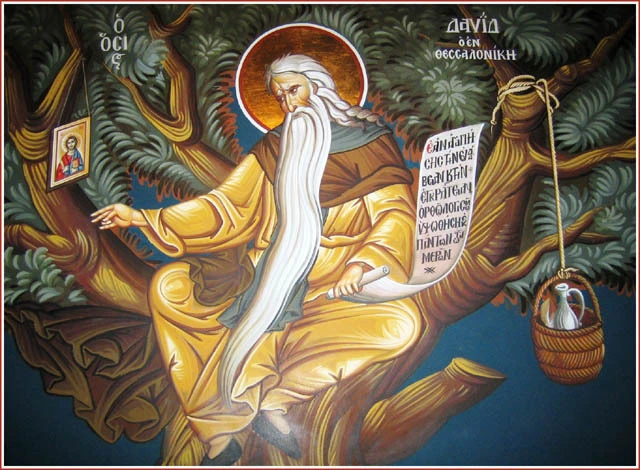
Saint David of Thessalonica pursued asceticism at the monastery of the holy Martyrs Theodore and Mercurius. Inspired by the example of the holy stylites, he lived in an almond tree in constant prayer, keeping strict fast, and enduring heat and cold. He remained there for three years until an angel told him to come down.
Saint David received from God the gift of wonderworking, and he healed many from sickness. The holy ascetic gave spiritual counsel to all who came to him. Having attained to passionlessness, he was like an angel in the flesh, and he was able to take hot coals into his hands without harm. He died the year 540.
Apolytikion The image of God was truly preserved in you, O Father, for you took up the Cross and followed Christ. By so doing you taught us to disregard the flesh for it passes away but to care instead for the soul, since it is immortal. Therefore your spirit, venerable David, rejoices with the angels.
Kontakion We bless you, servant of God David; you are like the angels and estranged from earthly things. Now you rejoice in divine gifts. Grant us to share in them also, O holy and righteous Father!
Jun. 25 - St. Febronia the Virgin Martyr of Nisibis

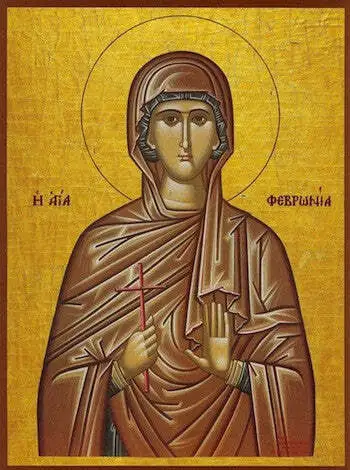
The Virgin Martyr Febronia suffered during the reign of Diocletian (284-305). She was raised at a monastery in the city of Sivapolis (Assyria). The head of the women’s monastery was the abbess Bryaίnē, the aunt of Saint Febronia. Being concerned about her niece’s salvation, she assigned her a stricter form of life than the other nuns. According to their monastic rule, on Fridays the sisters put aside their other duties and spent the whole day in prayer and the reading of Holy Scripture. The abbess usually assigned the reading to Saint Febronia.
News of her pious life spread throughout the city. The illustrious young widow Hieria, a pagan, began to visit her, and under the influence of her guidance and prayer she accepted holy Baptism, bringing her parents and kinsfolk to the Christian Faith.
Diocletian sent a detachment of soldiers to Assyria under the command of Lysimachus, Selinus and Primus for the destruction of Christians. Selenos, the uncle of Lysimachus, was noted for his fierce attitude against Christians, but Lysimachus was of a different frame of mind from him, since his mother had sought to inspire love for the Christian faith in her son, and she had died a Christian. Lysimachus had discussed with his kinsman Primus how it would be possible to deliver Christians from the hands of the torturer. When the detachment of soldiers approached the convent, its inhabitants hid. There remained only the abbess Bryaίnē, her helper Thomais and Saint Febronia, who was seriously ill at the time.
It grieved the abbess terribly that her niece might fall into the hands of the torturers, who might defile her. She prayed fervently that the Lord would preserve her and strengthen her in the confession of Christ the Savior. Selinus gave orders to bring him all the nuns of the convent. Primus with the detachment of soldiers found no one, except the two old women and Saint Febronia. He regretted that they had not hidden, and he suggested to the nuns that they flee. But the nuns decided not to leave the place of their labors and they entrusted themselves to the will of the Lord.
Primus told Lysimachus about the particular beauty of Saint Febronia and advised him to take her for himself. Lysimachus said that he would not seduce a virgin dedicated to God, and he asked Primus to hide the other nuns somewhere so that they would not fall into the hands of Selinus. One of the soldiers overheard the conversation and told Selinus. They led Saint Febronia off to the military commander with her hands bound and a chain around her neck. Selinus urged her to deny Christ, promising her honors, rewards, and marriage with Lysimachus. The holy virgin firmly and fearlessly answered that she had an Immortal Bridegroom, and she would not exchange Him for any mortal man. Selinus subjected her to fierce torture. The saint prayed, “My Savior, do not abandon me in this terrible hour!”
They beat the martyr for a long time, and blood flowed from her wounds. In order to intensify the suffering of Saint Febronia, they tied her to a tree and set a fire under it. The tortures were so inhuman, that the people began to demand an end to the torture, since there was no confession of guilt by the girl. Selinus continued to mock and jeer at the martyr, but Saint Febronia became silent. Because of weakness she was unable to utter a word. In a rage Selinus gave orders to tear out her tongue, smash her teeth, and finally, to cut off both hands and feet. The people were unable to bear such a horrid spectacle and they left the scene of the torture, cursing Diocletian and his gods.
Among the crowd was the nun Thomais, who afterwards recorded Saint Febronia’s martyrdom in detail, and also her student Hieria. She came forth out of the crowd and in the hearing of all reproached Selinus for his boundless cruelty. He gave orders to arrest her, but learning that Hieria was of illustrious standing whom he could not readily subject to torture, he said, “By your speech you have brought on Febronia even greater torment.” Finally, they beheaded the holy Martyr Febronia.
Departing the place of execution, Lysimachus wept and withdrew to his quarters. Selinus made ready to eat, but he was not able to take food, and went off to the quiet of his own chambers. Suddenly, he became like one deranged. Looking up to the heavens, he raved and bellowed like a bull, then fell down and struck his head on a marble column and died. When Lysimachus learned of this, he said, “ Great is the God of the Christians, Who has avenged Febronia’s blood, so unrighteously shed!” He prepared a coffin, placed the martyr’s body in it, and took it to the convent.
Abbess Bryaίnē fell senseless, seeing the mutilated remains of Saint Febronia. Later, she recovered her senses and gave orders to open the convent gates so that all would be able to come and venerate the holy martyr and glorify God Who had given her such endurance in suffering for Christ. Lysimachus and Primus renounced their idol worship and accepted both Baptism and monasticism. Hieria gave her wealth to the convent and petitioned Abbess Bryaίnē to accept her at the convent in place of Saint Febronia.
Every year, on the day of the martyric death of Saint Febronia, a solemn feast was celebrated at the convent. During the time of the all-night Vigil the nuns always saw Saint Febronia, at her usual place in church. From the relics of Saint Febronia occurred numerous miracles and healings. The Life of Saint Febronia was recorded by the nun Thomais, an eyewitness to her deeds.
In the year 363 the relics of Saint Febronia were transferred to Constantinople.
Soon after the death of Saint Febronia, Saint James the Bishop of Nisibis built a church and transferred into it a portion of the of the holy martyr’s relics.
Apolytikion Your lamb Febronia, calls out to You, O Jesus, in a loud voice: “I love You, my Bridegroom, and in seeking You I endure suffering. In baptism I was crucified so that I might reign in You, and I died so that I might live with You. Accept me as a pure sacrifice, for I have offered myself in love.” Through her prayers save our souls, since You are merciful.
Kontakion You were adorned with the grace of virginity and the beauty of martyrdom, O Febronia, bride of Christ. You wisely carried your lamp and ran to your Bridegroom receiving an incorruptible crown. Pray for those who faithfully sing hymns of praise to you!
Jun. 24 - Nativity of the Holy Glorious Prophet, Forerunner and Baptist, St. John

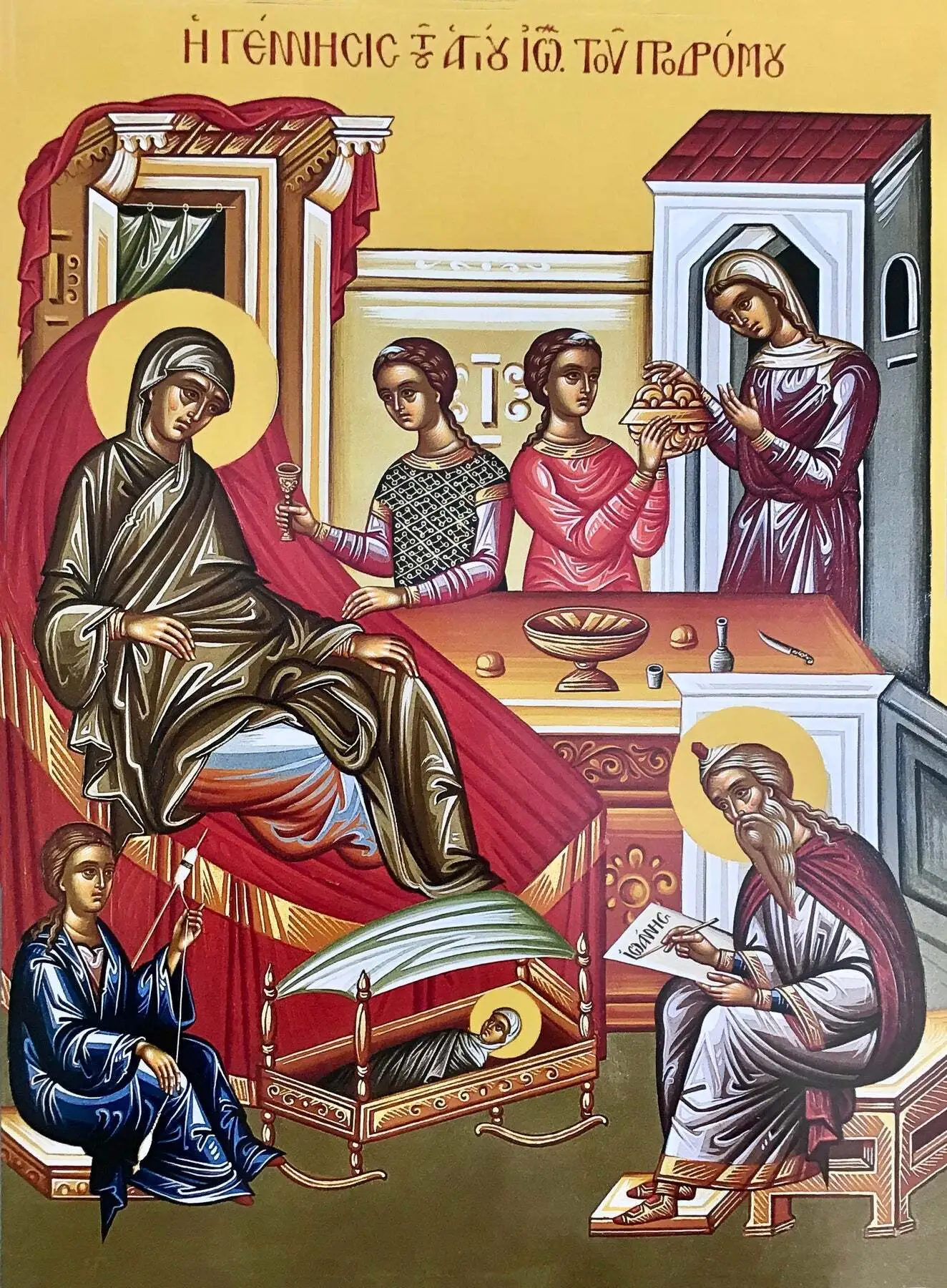
The Nativity of the Holy Forerunner and Baptist of the Lord, John: The Gospel (Luke. 1: 5) relates that the righteous parents of Saint John the Baptist, the Priest Zachariah and Elizabeth, lived in the ancient city of Hebron. They reached old age without having children, since Elizabeth was barren. Once, Saint Zachariah was serving in the Temple at Jerusalem and saw the Archangel Gabriel, standing on the right side of the altar of incense. He predicted that Saint Zachariah would father a son, who would announce the Savior, the Messiah, awaited by the Old Testament Church. Zachariah was troubled, and fear fell upon him. He had doubts that in old age it was possible to have a son, and he asked for a sign. It was given to him, and it was also a chastisement for his unbelief. Zachariah was struck speechless until the time of the fulfillment of the archangel’s words.
Saint Elizabeth came to be with child, and fearing derision at being pregnant so late in life, she kept it secret for five months. Then her relative, the Virgin Mary, came to share with her Her own joy. Elizabeth, “filled with the Holy Spirit,” was the first to greet the Virgin Mary as the Mother of God. Saint John leaped in his mother’s womb at the visit of the Most Holy Virgin Mary and the Son of God incarnate within Her.
Soon Saint Elizabeth gave birth to a son, and all the relatives and acquaintances rejoiced together with her. On the eighth day, in accordance with the Law of Moses, he was circumcised and was called John. Everyone was amazed, since no one in the family had this name. When they asked Saint Zachariah about this, he motioned for a tablet and wrote on it: “His name is John.” Immediately his tongue was loosed, and Saint Zachariah glorified God. He also prophesied about the Coming into the world of the Messiah, and of his own son John, the Forerunner of the Lord (Luke. 1: 68-79).
After the Nativity of our Lord Jesus Christ and the worship of the shepherds and the Magi, wicked king Herod gave orders to kill all male infants. Hearing about this, Saint Elizabeth fled into the wilderness and hid in a cave. Saint Zachariah was at Jerusalem and was doing his priestly service in the Temple. Herod sent soldiers to him to find out the abode of the infant John and his mother. Zachariah answered that their whereabouts were unknown to him, and he was killed right there in the Temple. Righteous Elizabeth continued to live in the wilderness with her son and she died there. The child John, protected by an angel, dwelt in the wilderness until the time when he came preaching repentance, and was accounted worthy to baptize the Lord.
Apolytikion Prophet and Forerunner of the coming of Christ, although we cannot praise you worthily, we honor you in love at your nativity, for by it you ended your father’s silence and your mother’s barrenness, proclaiming to the world the incarnation of the Son of God!
Kontakion Today the formerly barren woman gives birth to Christ’s Forerunner, who is the fulfillment of every prophecy; for in the Jordan, when he laid his hand on the One foretold by the prophets, he was revealed as Prophet, Herald, and Forerunner of God the Word.
Jun. 23 - St. Agrippina the Virgin Martyr of Rome

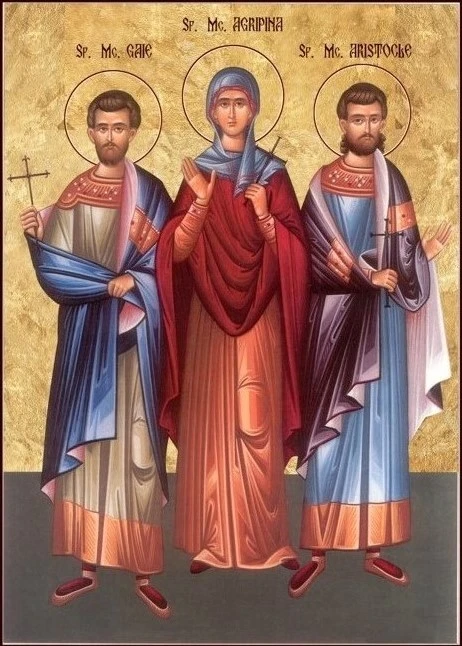
The Holy Martyr Agrippina was by birth a Roman. She did not wish to enter into marriage, and totally dedicated her life to God. During the time of persecution against Christians under the emperor Valerian (253-259) the saint went before the court and bravely confessed her faith in Christ, for which she was given over to torture. They beat the holy virgin with sticks so severely that her bones broke. Afterwards they put Saint Agrippina in chains, but an angel freed her from her bonds.
The holy confessor died from the tortures she endured. The Christians Bassa, Paula and Agathonike secretly took the body of the holy martyr and transported it to Sicily, where many miracles were worked at her grave. In the eleventh century the relics of the holy Martyr Agrippina were transferred to Constantinople.
Apolytikion Your lamb Agrippina calls out to You, O Jesus, in a loud voice: "I love You, my Bridegroom, and in seeking You I endure suffering. In baptism I was crucified so that I might reign in You, and I died so that I might live with You. Accept me as a pure sacrifice, for I have offered myself in love." Through her prayers save our souls, since You are merciful.
Kontakion The day has come on which the Church commemorates your radiant contest and martyrdom. She calls upon all to cry to you with gladness: “Rejoice, all-honored virgin-martyr Agrippina.”
Jun. 22 - St. Eusebios the Hieromartyr, Bishop of Samosata

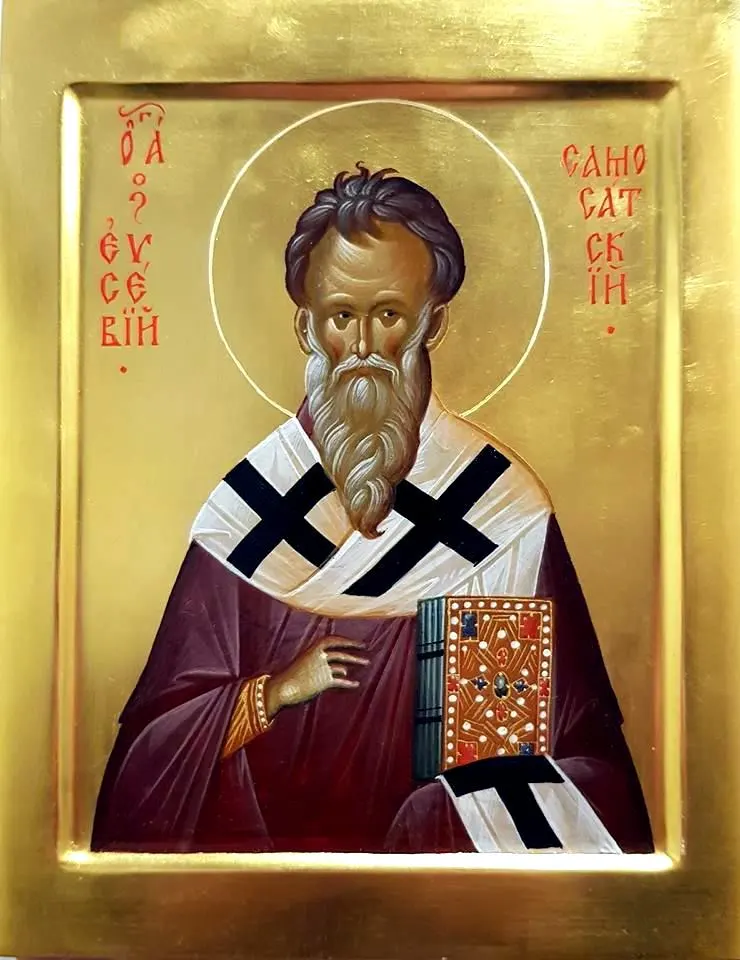
The Hieromartyr Eusebios (his name means pious) the Bishop of Samosata, stood firmly for the Orthodox Confession of Faith, proclaimed at the First Ecumenical Synod at Nicea in the year 325. Therefore, he suffered persecution by the Arians, and was repeatedly deprived of his See and banished. Emperor Constantius (337-361), who supported the Arians, learned that Saint Eusebios kept a conciliar decree regarding the election of the Orthodox Archbishop Meletios to the See of Antioch. He was ordered to surrender the decree, but the Saint boldly refused to obey him. The enraged Emperor sent a message that if he did not surrender the decree, then his right hand would be cut off. Saint Eusebios stretched forth both hands to the emissary saying, “Cut them off, but I will not give up the conciliar decree, which denounces the wickedness and iniquity of the Arians.”
Emperor Constantius marveled at the hierarch's audacity, but did not harm him.
During the reign of Emperor Julian the Apostate (361-363), even more difficult times ensued, and an open persecution against Christians began. Saint Eusebios concealed his identity and went about in the garb of a soldier all across Syria, Phoenicia and Palestine, urging Christians not to abandon the Orthodox Faith. He ordained priests and deacons for the desolated churches, and he consecrated hierarchs who renounced the Arian heresy. After Julian the Apostate’s death, he was succeeded by the devout Emperor Jovian (363-364), during whose reign the persecutions stopped. Returning from exile, Saint Meletios convened a local Council at Antioch in the year 379 on the advice of Saint Eusebios. Twenty-seven hierarchs participated, and the Council reaffirmed the Orthodox teaching of the First Ecumenical Council. The Arians signed the conciliar decree, fearing the steadfast defenders of Orthodoxy: the holy hierarchs Meletios, Eusebios and Pelagios, who had great influence with the Emperor. After Jovian's death, the Arian Valentinian (364-378) came to power.
The Orthodox were again subjected to persecution. Saint Meletios was banished to Armenia, Saint Pelagios to Arabia, and Saint Eusebios was condemned to exile in Thrace. After receiving the imperial decree, Saint Eusebios left Samosata by night, in order to prevent tumult among the people who esteemed him. When they learned of the hierarch's departure, the faithful followed after him with tears and begged him to return. The Saint refused the entreaty of those who had come, saying that he had to obey the authorities. The Saint urged his flock to hold fast to Orthodoxy, then blessed them and went to the place of his exile. The Arian Eunomios became Bishop of Samosata, but the people did not accept this heretic. The Orthodox would not go to his church and avoided meeting with him. The heretical Arian perceived that it was impossible to induce the Orthodox flock to follow him.
Emperor Gratian (375-383) succeeded to the throne, and all the Orthodox hierarchs who had been banished under the Arians were brought back from exile. Saint Eusebios also returned to Samosata and continued with the task of building up the Church. Along with Saint Meletios, he appointed Orthodox hierarchs and clergy to the Arian parishes. In the year 380 he arrived in the Arian city of Dolikhina to establish the Orthodox Bishop Marinus there. An Arian woman threw a roof tile at the holy hierarch’s head. As he lay dying, Saint Eusebios asked her for wine and begged those around not to harm her. The Saint's body was taken to Samosata and was buried by his flock. The Saint’s nephew Antiokhos succeeded him and the Church of Samosata continued to confess the Orthodox Faith, which was firmly spread by the efforts of the holy Hieromartyr Eusebios
Apolytikion By sharing in the ways of the Apostles, you became a successor to their throne. Through the practice of virtue, you found the way to divine contemplation, O divinely-inspired one: by rightly dividing the Word of truth, you defended the Faith, even to the shedding of your blood. O Hieromartyr Eusebios, entreat Christ God to save our souls.
Kontakion As one who lived piously among Hierarchs and who underwent martyrdom, O divinely-wise one, you abolished the sacrifices of idolatry and showed yourself as the protector of your flock. Therefore, we cry fervently to you: “By your intercessions, deliver us from all misfortunes, O Eusebios our Father.”
What are Gabe Evans chances of winning?
Guy sent me a mailer advertising Trump's "full support" and he won't shut the hell up on my John Oliver reruns. I wasn't going to vote for him anyway, he's a Republican, but I'm now personally invested in his loss.
Jun. 21 - St. Julian the Martyr of Tarsus

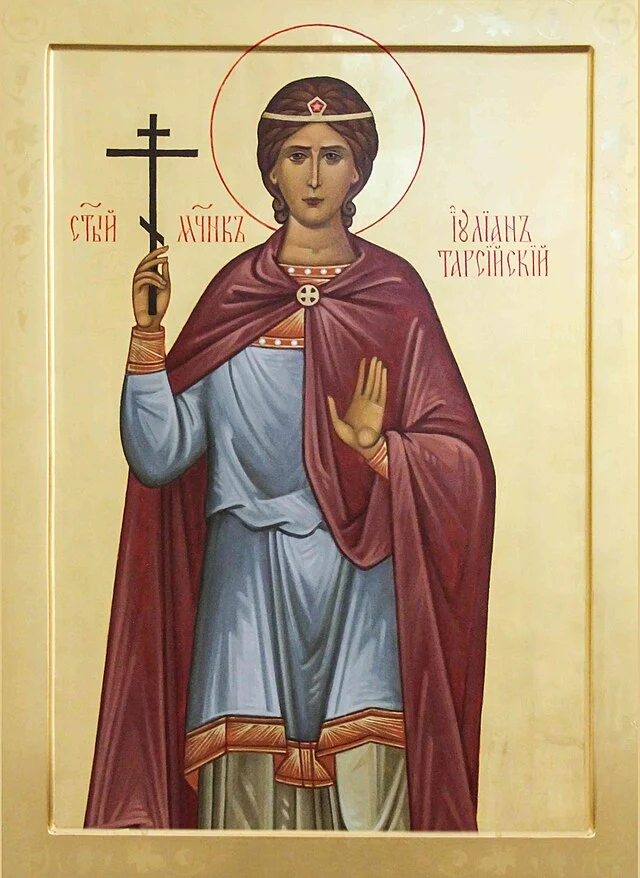
The Holy Martyr Julian of Tarsus was born at Diocesarea in the province of Cilicia. He was the son of a pagan senator, but his mother was a Christian. After the death of her husband, she and Julian moved to Tarsus, where her son was baptized and raised in Christian piety. When Julian reached the age of eighteen, Emperor Diocletian (284-305) began to persecute Christians, issuing a decree that everyone had to offer sacrifice to the idols. If they refused, they would be tortured. Among those arrested was Saint Julian. They brought him before the eparch Marcian to be tried, and for a long time they urged him to renounce Christ. Neither tortures nor threats, nor promises of gifts or honors could convince the devout young man to sacrifice to the idols and deny Christ, and so the holy confessor remained steadfast in his faith.
For a whole year they led the martyr through the cities of Cilicia, everywhere subjecting him to interrogation and torture, after which they threw him in prison. Saint Julian’s mother followed her son and prayed that the Lord would strengthen him. In the city of Aegea, she besought the eparch to let her to visit the prison, ostensibly to persuade her son to offer sacrifice to the idols. When she saw him, she did just the opposite. She spent three days in prison with Saint Julian, exhorting him to remain strong until the end.
Once again, Saint Julian was brought before the eparch. Thinking that his mother had persuaded her son to obey the imperial decree, Marcian tried to convince her to offer sacrifice, but she continued to confess Jesus Christ, and boldly denounced polytheism. Marcian then ordered that her feet be cut off, since she had followed her son from Tarsus.
Then Saint Julian was placed into a sack filled with sand and poisonous snakes, and it was thrown into the sea. The Martyr's body was carried by the waves to the shores of Alexandria. There his body was buried by a certain pious Christian. Saint Julian's death occurred around the year 305. Afterward, his relics were transferred to Antioch.
Saint John Chrysostom honored the holy Martyr Julian with an encomium, and fragments of the Saint's relics are found in the Monasteries of Pantokrator and Saint Panteleimon on Mount Athos.
Apolytikion Your mother guided you to become a glorious soldier of Christ, and you were clad in the armor of the Spirit, and entering the contest, you cast down the Enemy. Now, O godly-minded Julian, pray to Christ God for all of us.
Kontakion Let us praise Julian today, the unconquerable holy warrior, the champion and vessel of truth, and let us cry out to him: “Intercede with Christ our God for all of us.”
Disappointing, but not surprising.
Because we are convinced it is true.
Jun. 20 - St. Methodius the Hieromartyr, Bishop of Patara or Olympus in Lycia

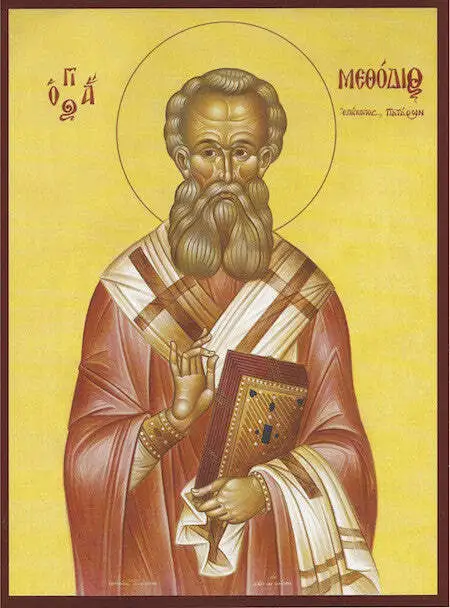
The Hieromartyr Methodius, Bishop of Patara (Lycia in Asia Minor), was distinguished for his genuine monastic humility. Calmly and with mildness he instructed his flock, but he firmly defended the purity of Orthodoxy and he energetically contended against heresies, especially the widespread heresy of the Origenists. He left behind him a rich literary legacy: works in defense of Christianity against paganism, explications of Orthodox dogmas against the heresy of Origen, moral discourses, and explanations of Holy Scripture.
Because of his wisdom and virtue, this Saint was surnamed Eubulus ("of good counsel"). He was an eminent theologian and one of the first to oppose and refute the heretical writings of Origen. According to Jerome (De vir. ill., 83) and Socrates the historian (Eccl. Hist., 6:13), he was bishop, not of Patara (as a sixth century work by Leontius the Byzantine wrongly asserts), but of Olympus in Lycia, and later, of Tyre in Phoenicia. It appears he was called Bishop of Patara by later writers because his famous dialogue concerning the resurrection takes place in that city.
Saint Methodius was arrested by the pagans, steadfastly confessed before them his faith in Christ, and he was sentenced to death by beheading in the year 312, under Emperor Maximinus. Among his extant writings is one called Symposium of Virgins.
Apolytikion Your blood cries out to God from the earth like that of Abel, divinely-wise holy hierarch, Methodius. You openly preached the Incarnation of God, putting the heresy of Origen to shame. You were translated to the heavenly bridal chamber: Pray to Christ God that our souls may be saved.
Kontakion As a priest of the mysteries of the Holy Trinity, and a preacher of the commandments of God that surpass understanding, you were the confirmation of Orthodox Christians, O Methodius! You denounced the errors of heretics; for the sake of the True Faith you shed your blood as a hieromartyr. Now as you stand before Christ with the angels, pray that we may be saved.
Jun. 19 - St. Paisios the Great

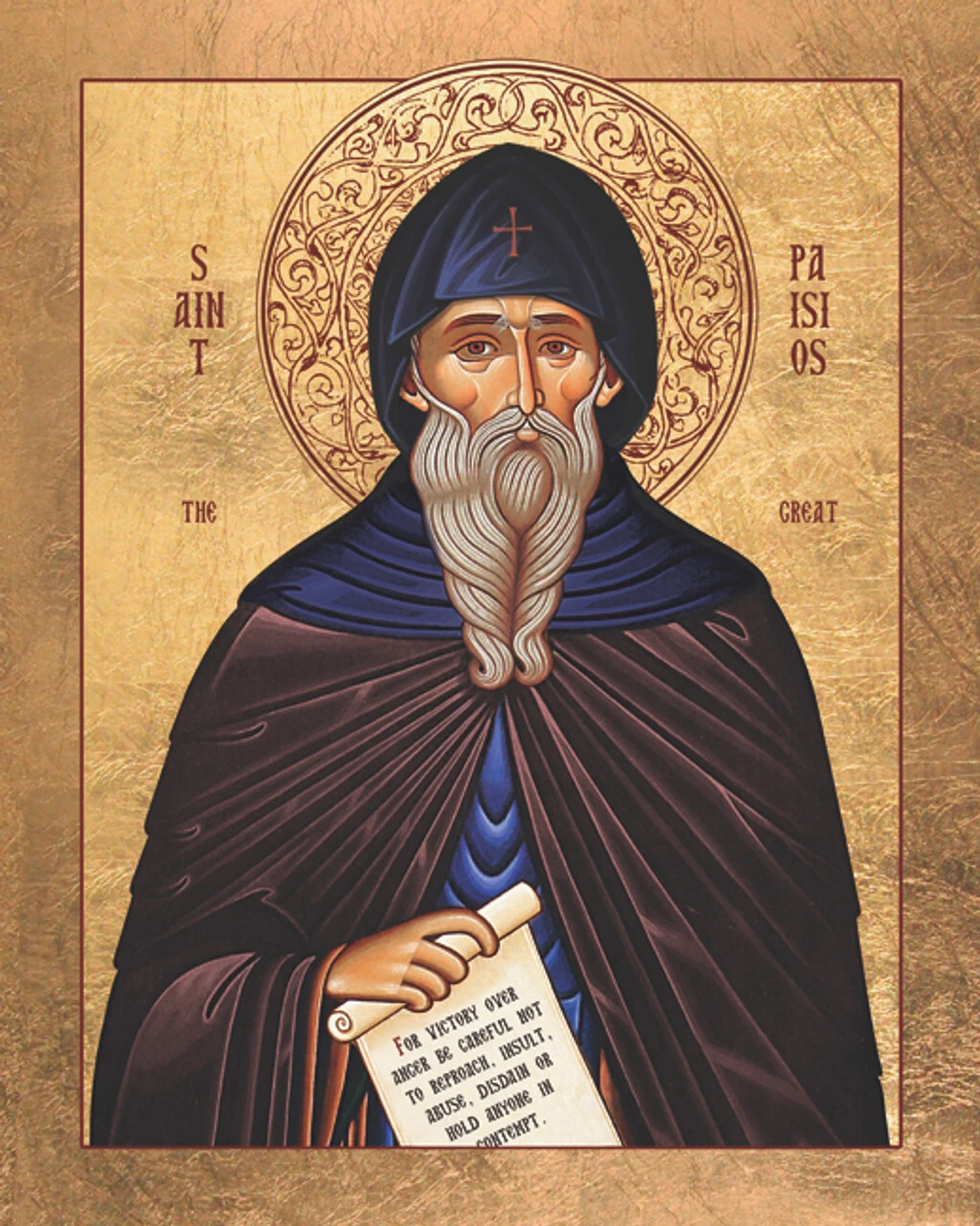
Saint Paisios the Great lived in Egypt. His parents, Christians, distributed generous alms to all the needy.
After the death of her husband his mother, on the suggestion of an angel, gave her young son Paisios to the clergy of the church.
The youth Paisios loved monastic life and spent his time in one of the Egyptian sketes. Renouncing his own will, he lived under the spiritual guidance of Saint Pambo, finishing all the tasks assigned him. The Elder said that a new monk in particular needs to preserve his sight, in order to guard his senses from temptation. Paisios, heeding the instruction, went for three years with his eyes cast downwards. The saintly ascetic read spiritual books, and he was known for his ascetic fasting and prayer. At first he did not eat any food for a week, then two weeks. Sometimes, after partaking of the Holy Mysteries of Christ, he survived without food for seventy days.
Saint Paisios went into the Nitrian desert in search of solitude. There he lived in a cave carved out by his own hands. The saint was granted a wondrous vision: the Lord Jesus Christ revealed to him that through his labors the Nitrian wilderness would become inhabited by ascetics. He asked the Lord where the monks would obtain the necessities of life in the desert. The Lord said that if they would fulfill all His commandments, He Himself would provide all their necessities, and would deliver them from demonic temptations and cunning.
In time, a number of monks and laymen gathered around Saint Paisios, and a monastery was established. The most important rule of Saint Paisios was that no one would do anything by his own will, but in all things would fulfill the will of his elders.
Since his tranquility was being disturbed by so many people, the saint withdrew to another cave farther away. Once, he was transported to a paradisical monastery and partook of the immaterial divine food. After his ascetic labors for salvation, the Lord granted His saint the gift of prescience and healing the souls of men.
One of his disciples, with the saint’s blessing, went to sell his handicrafts in Egypt. On the way he encountered a Jew, who told the simple-minded monk that Christ the Savior is not the Messiah, and that another Messiah will come. Confused, the monk said, “Maybe what you say is true,” but he did not attribute any particular significance to his words. When he returned, he saw that Saint Paisios would not acknowledge his arrival, and he asked the reason for his anger. The saint said, “My disciple was a Christian. You are not a Christian, for the grace of Baptism has departed from you.” The monk repented with tears, and begged to have his sin forgiven. Only then did the holy Elder pray and ask the Lord to forgive the monk.
A certain monk on his own initiative left the desert and moved near a city. There he had encounters with a woman, who hated and blasphemed Christ the Savior. Under her influence, he not only left the monastery, but also scorned faith in Christ, and finally he reached a state of total disbelief.
Once, through the blessed Providence of God, Nitrian monks came by his home. Seeing them, the sinner remembered his own former life and he asked the monks to ask Saint Paisios to pray for him to the Lord. On hearing the request, the saint prayed fervently, and his prayer was heard. The Lord, appearing to His saint, promised to forgive the sinner. Soon the seduced monk’s woman companion died, and he returned to the desert where, weeping and distressed for his sins, he began to labor at deeds of repentance.
Saint Paisios distinguished himself by his great humility, and performed ascetic deeds of fasting and prayer, but he concealed them from others as far as possible. When the monks asked which virtue is the highest of all, the saint replied, “Those which are done in secret, and about which no one knows.”
Saint Paisios died in the fifth century at a great old age, and he was buried by the monks. After some time his relics were transferred by Saint Isidore of Pelusium to his own monastery and placed beside the relics of his friend Saint Paul, with whom Saint Paisios was particularly close during his life.
Apolytikion Fervently, let us honor the God-bearer Paisios, an Angel in the flesh, the crown of Monastics, an incorporeal man and a citizen of Heaven, who celebrates with us, granting grace to all who rejoice in his memory.
Kontakion Let us, the faithful, sing praises to the godly-wise Paisios, the adornment of the desert, equal of the Angels, the friend of Christ, and the glory of Monastic Saints. Let us cry to him: “Rejoice, O Father Paisios.”
Jun. 18 - Sts. Leontius, Hypatius, and Theodulus the Martyrs of Syria

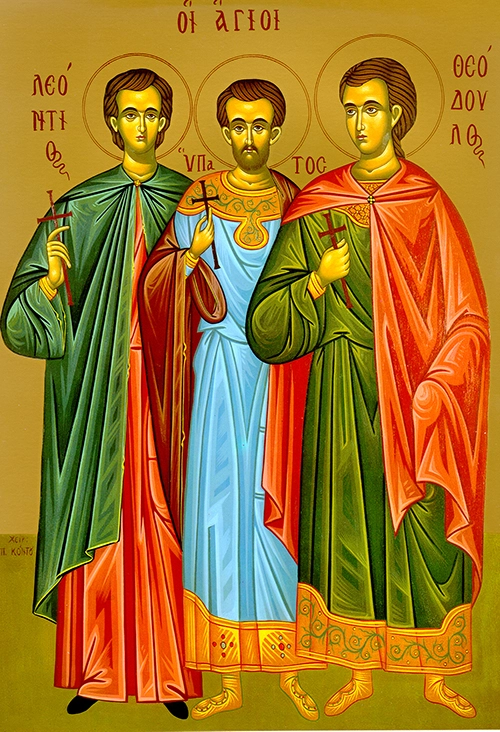
The Holy Martyrs Leontius, Hypatius, and Theodulus were Roman soldiers. The holy Martyr Leontius, a Greek by origin, served as a military-chief in the imperial army in the Phoenician city of Tripoli during the reign of Vespasian (70-79). Leontius was distinguished for his bravery and good sense, and the people of Tripoli held him in deep respect because of his virtue.
The emperor appointed the Roman senator Adrian as governor of the Phoenician district, with full powers to hunt out Christians, and in case of their refusal to offer sacrifice to the Roman gods, to give them over to torture and death. And on his way to Phoenicia Adrian received a report that Saint Leontius had turned many away from worshipping the pagan gods. The governor sent the tribune Hypatius with a detachment of soldiers to Tripoli so as to find and arrest the Christian Leontius. Along the way the tribune Hypatius fell seriously ill, and being near death, he saw in a dream an angel, which said: “If you wish to be healed, you and your soldiers should say three times: ‘God of Leontius, help me.’”
Opening his eyes Hypatius beheld the angel and said: “I was sent to arrest Leontius, how is it that I should appeal to his God?” At this moment the angel became invisible. Hypatius told his dream to the soldiers, among whom was his friend Theodulus, and all of them together asked for help from the God Whom Saint Leontius confessed. Hypatius was immediately healed to the great joy of his soldiers, but only Theodulus sat aside, pondering the miracle. His soul was filled with love for God, and he told Hypatius to proceed twice as quickly to the city in search of Saint Leontius.
Upon their arrival in the city, a stranger met them and invited them to his house, where he lavishly hosted the travellers. Learning that their hospitable host was Saint Leontius, they fell on their knees and asked him to enlighten them with faith in the True God. They were baptized here, and when Saint Leontius prayed over them calling on the Name of the Most Holy Trinity, a luminous cloud overshadowed the newly-baptized and poured forth rain. The remaining soldiers in search of their commander arrived in Tripoli, where the governor Adrian had also arrived. Learning what had happened, he ordered Saints Leontius, Hypatius, and Theodulus to be brought to him. After threatening them with torture and death, he demanded that they renounce Christ and offer sacrifice to the Roman gods.
All the martyrs firmly confessed their faith in Christ. Saint Hypatius was put under a column and raked with iron claws, and Saint Theodulus was mercilessly beaten with rods. Seeing the steadfastness of the saints, they beheaded them. And after torture, they sent Saint Leontius to prison. In the morning he came before the governor. Adrian tried to entice the holy martyr with honors and rewards, and accomplishing nothing, he gave him over to new tortures. The holy martyr was suspended head downwards from a pillar with a heavy stone about his neck, but nothing could make him renounce Christ. The governor gave orders to beat the sufferer with rods until he died. They then threw the body of the holy Martyr Leontius outside the city, but Christians reverently gave it burial near Tripoli. The death of the holy martyrs occurred between 70-79.
The accusation against Saint Leontius, and his sufferings and death are recorded on tin tablets prepared by the court scribe. These tablets were placed at the grave of the holy martyr.
Apolytikion Your holy martyr Leontius and his companions, O Lord, through their sufferings have received incorruptible crowns from You, our God. For having Your strength, they laid low their adversaries, and shattered the powerless boldness of demons. Through their intercessions, save our souls!
Kontakion You confounded the wicked plans of tyrants and exposed the godless worship of the pagan Greeks. You illumined all mankind with the knowledge of God by your teachings of true piety, divinely-wise martyr. Therefore, Leontius, we lovingly honor your memory.
No, specifically not eugenics, did you miss the part where I said this is clearly a joke?
FFS, I'm not actually advocating for eugenics. I'm saying those people are dumbfucks and probably spreading their dumbfuckery to their kids.
Sure, let's do start using it correctly. I'll go first:
Israel is engaged in mass murder of Palestinian Civilians.
If someone's dumb enough to still be undecided or on the fence at this point, they should probably be forcibly sterilized by the state, because that's a section of the gene pool that needs some chlorine.
The Contemporary English Version or the Revised Standard Version are both pretty decent.
Ah that's good, I initially thought you were spreading this in support! My apologies for rushing to judgement.
Tell me about it! The other day, I even saw a guy eating a cheeseburger, AND it had bacon on it! It's like, so you have no shame at all?!
I am eternally grateful to have escaped Texas, the way they are treating women is utterly unconscionable.
Any parties or interest groups that oppose it? I'd like to support them if I could, as much of a longshot as it may be. Gambling addiction is such a terrible thing and I'd like to fight against the state taking advantage of these people and making it so easy to potentially ruin their lives.
I'm sorry, I don't understand?
True, sorry, didn't read the body text, just the title.
No he's right actually, you just have to be 35 to be president, not to get elected president. If AOC were the nominee and she won, she would definitely be president!




